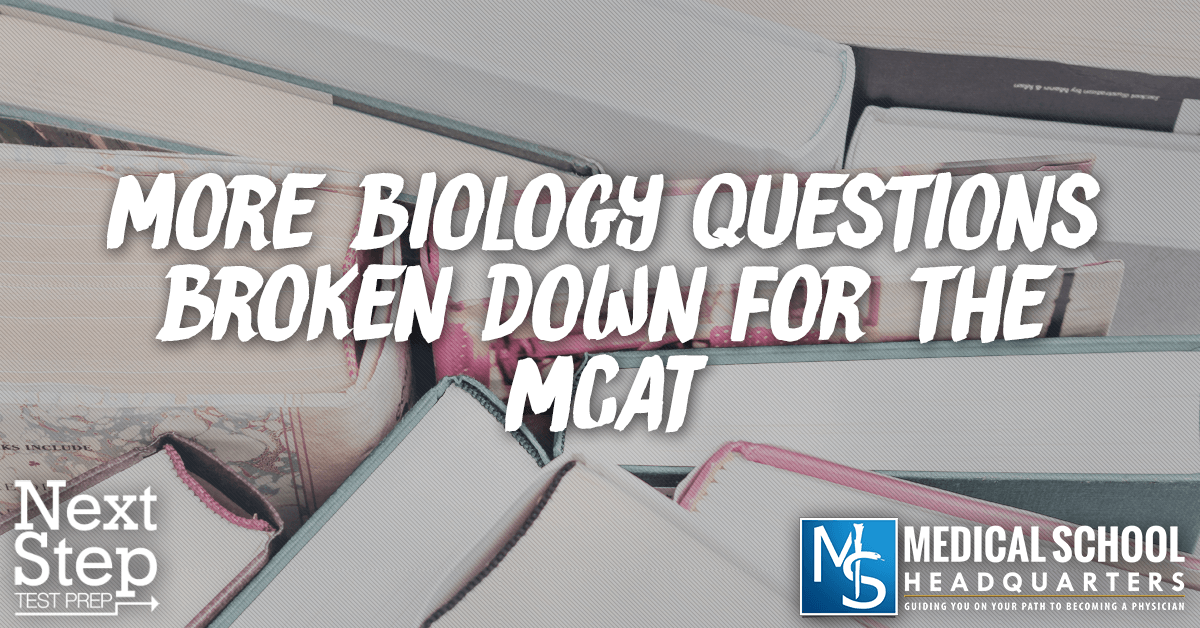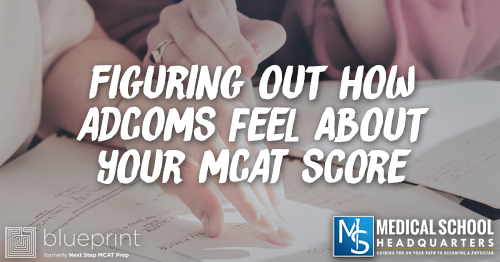Apple Podcasts | Google Podcasts

Session 71
Biology infiltrates a lot of different areas of the MCAT, so you need to be prepared for it. We break down some biology discrete questions today to help you!
If you’re in the California area, try to make it to the UC Davis Prehealth Conference. They are huge so try be there next year if you can. Surprisingly, a feedback I got from the students there was that they love listening to us discussing questions. So we want to give what students want and we’re doing some biology discrete questions today. Also, check out all the other podcasts at Meded Media.
Lastly, don’t forget to check out Blueprint MCAT (formerly Next Step Test Prep) if you need some help with your MCAT prep. Use promo code “MSHQ” for 10% off Next Step full-length practice tests or “MSHQTOC” for $50 off MCAT tutoring or the Next Step MCAT Course at Blueprint MCAT (formerly Next Step Test Prep)!
Back to today’s podcast…
[01:55] Vitamins Are Important
Question 11: Many vitamins are cofactors which are important in the proper functioning of:
- (A) Glycolipids
- (B) Phospholipids
- (C) Proteins
- (D) Glycoproteins
Bryan’s Insights:
Why are vitamins so important? And cofactors are important for the functioning of the enzymes. Vitamins, themselves, are helper molecules. They help out our enzymes to do their jobs.
And the enzymes are proteins. Therefore, the right answer is (C).
[03:00] Let’s Talk about the CNS!
Question 57: All of the following are glia in the central nervous system, except:
- (A) Oligodendrocytes
- (B) Astrocytes
- (C) Ependymal cells
- (D) Schwann cells
Bryan’s Insights:
Schwann cells are the myelinating cells in the peripheral nervous system. This is the correct answer since all the others are in the central nervous system. Oligodendrocytes are myelinating cells in the CNS. Astrocytes are supporting cells. Ependymal cells make cerebrospinal fluid.
You have to recognize that glia is a foreign word for glue. So it’s the glue that holds the central nervous system together. Most MCAT books will have a list of all the glial cells and what they do. So you have to know them. Well-prepared MCAT students should be able to recognize these.
[04:48] Sperm Issues
Question 58: In cases of azoospermia, the lack of sperm generation, most likely results directly from exogenous suppression of which hormone?
- (A) FSH
- (B) LH
- (C) GNRH
- (D) Somatotropin
Bryan’s Insights:
The correct answer here is (A). FSH is Follicle Stimulating Hormone. It helps germ cells mature.
MCAT students spend a bunch of time memorizing the hormone cascade of the menstrual cycle. It’s a popular topic for questions on the MCAT. Bryan says it’s just complicated enough to be able to scare you. But once you understand how all the pieces go together, you’d realize it makes sense.
Having said that, you can’t ignore them. You have to recognize that FSH is not just maturing ova but it’s maturing sperm as well. So an issue with the sperm is an issue with FSH.
LH is Luteinizing Hormone that causes ovulation. It also helps produce testosterone in the male. GNRH is the tropic hormone that causes FSH and LH to be released. Somatotropin is just a fancy name for growth hormone. So it’s not directly related to primary sexual characteristics like maturing germ cells.
[06:52] One Step at a Time
When analyzing multiple steps such as the above and things like intracellular cascades of signalling molecules or endocrine cascades or metabolic pathways, only go one step at a time.
Go to the next step in the process or one step back in the process. Look if it’s the answer. If yes, then done. Don’t go four steps away or even two steps away if you don’t have to.
[07:25] Vitamins, Again
Question 59: An experimental drug designed to prevent capsular contracture around medical implants works by sequestering a co-factor required for collagen synthesis. Which co-factor is the most likely target for this drug?
- (A) Vitamin A
- (B) Vitamin B1
- (C) Vitamin C
- (D) Vitamin D
Bryan’s Insights:
Lack of Vitamin C causes scurvey. Vitamin C is very important for connective tissue, specifically collagen. If you targeted Vitamin C, that would affect collagen manufacture, maintenance, and so on.
You’re not expected to know everything that vitamins do in the body. But you should know some basics.
Vitamin A has immune function and is involved in cell growth, especially epithelial cell growth and maintenance.
Vitamin B1, Thiamine, is associated with metabolism. The MCAT fact that tends to crop up a lot is thiamine deficiency which is most commonly seen in the first world and severe cases of alcoholism. This results to Korsakoff Syndrome, characterized by memory derangement and language problems.
Vitamin D is primarily associated with being generated by UV light hitting your skin. That’s where we get the final form of Vitamin D made. It’s primarily associated with proper calcium absorption in the intestines. So we put Vitamin D in milk to allow better calcium absorption.
The MCAT is an inch deep and a mile wide. So when you’re studying, know a little bit about it. Don’t memorize everything about every pathway of each vitamin.
[10:19] Blueprint MCAT (formerly Next Step Test Prep)
Again, don’t forget to check out Blueprint MCAT (formerly Next Step Test Prep). If you’re looking for the premier way to study for the MCAT, get their one-on-one tutoring. It’s the best and only way I recommend if you want the best MCAT prep. Need MCAT Prep? Save on tutoring, classes, and full-length practice tests by using promo code “MSHQ” for 10% off Next Step full-length practice tests or “MSHQTOC” for $50 off MCAT tutoring or the Next Step MCAT Course at Blueprint MCAT (formerly Next Step Test Prep)!
Links:
SEARCH SITE
SEARCH SITE
LISTEN FOR FREE











